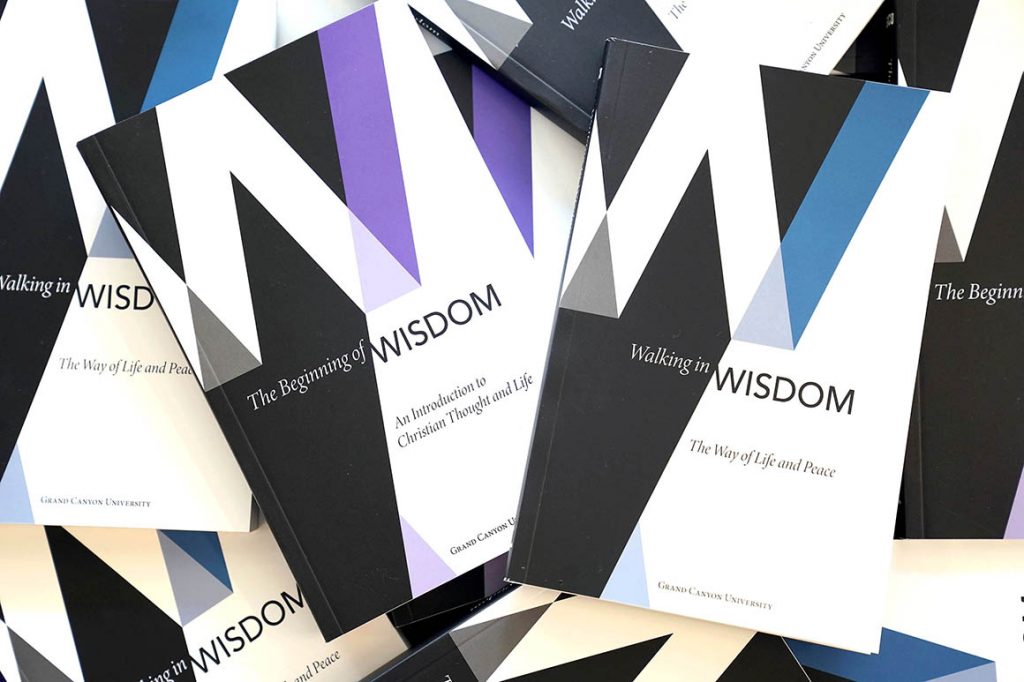
“We said, ‘We’re going to ask really foundational questions about how people think and how they live. Who are we? Where do we come from? What is our purpose? Where are we going from here?’ Those kinds of things, people answer implicitly – they don’t even know they are answering.” – Dr. Jason Hiles
The world has changed dramatically in the last decade or two.
Should teaching the Christian worldview change along with it?
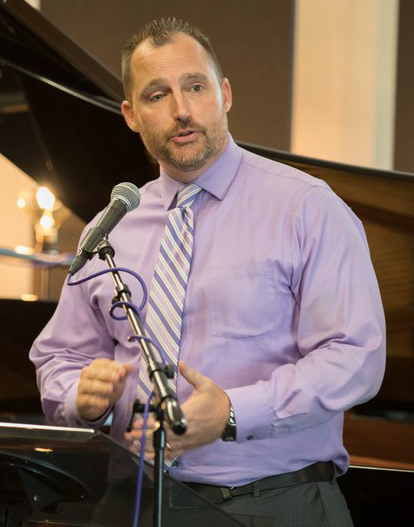
The answer, Grand Canyon University leaders concluded, was a resounding yes. That was the impetus to revise and update GCU’s two books for Christian worldview classes with the goal of spreading those teachings to the world beyond, including K-12 education and churches.
It started with a conversation College of Theology Dean Dr. Jason Hiles had with GCU President Brian Mueller.
“Brian essentially said, ‘Hey, you’ve got this incredible content. You’re doing this with students all the time. We’ll have between 21,000 and 22,000 seats of Christian worldview every year. Why are we keeping this to ourselves? We have this amazing content that the faculty have written,’” Hiles recalled.
“It’s an introduction to Christianity from a Christian worldview perspective. How does Christian worldview fit in to what we do as a university? We haven’t told that story before.”
The result is a GCU-wide collaboration led by Dr. Rich Holland and Dr. Dan Diffey, written entirely by COT faculty, facilitated by Canyon Promotions and made available at the Lope Shop and, as audio books, on theologycommons.org:
Volume 1, titled “The Beginning of Wisdom: An Introduction to Christian Thought and Life,” is for Christian Worldview 101 classes and explores having reverence for God, understanding who He is and seeing how that shapes living in today’s world.
Volume 2 – “Walking in Wisdom: The Way of Life and Peace” is for the more advanced Christian Worldview 316 classes and provides tangible ways to build a life in Christ – cultivating virtue, interacting with others, immersing yourself in a community in healthy ways and integrating faith into an academic discipline.
It’s not always an easy conversation these days, but the books are designed to help readers cut through the world’s divisions and find unity and peace through understanding the Christian worldview perspective.
The best way to make that happen was to have a perspective grounded in what’s happening today.
“What you would call worldview assumptions are underlying everything we do during the day,” Hiles said. “When you see the Republicans and the Democrats butting heads, it feels like it’s political, it feels like it’s public, it feels like it’s an issues-based conversation, but it’s actually tapping into deep convictions about the nature of the world we live in and our place within it.”
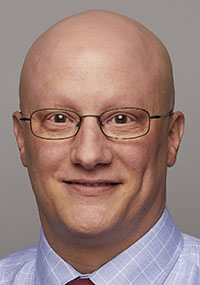
The project, the fourth revision of material first written in 2015, required authors who live in that world and understand it. That’s where the COT faculty comes in.
“The collection of scholars that we have writing these chapters are well-seasoned folks,” Holland said. “These are people who have been living the Christian life, engaged in Christian ministry, studying theology and philosophy, and teaching theology and philosophy for a really long time. I think the collective wisdom of living the Christian life does indeed come out in every one of these chapters. I think they did a fantastic job.”
Said Diffey, “We don’t just live in our ivory towers. We have boots on the ground. I think if we were the types that were just in academia, it would be very hard because we’re writing to a 100-level audience. We’re writing to an audience that comes from different backgrounds, different beliefs. To write the way that they understand without using too much Christian jargon is difficult. We want to use the words of Christianity, but we always want to be clear, we want to be able to define those well and we want to use them when they’re necessary.”
For example, Diffey wrote a passage about work:
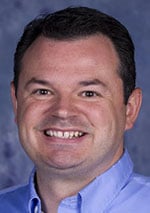
“Most people don’t like work. They think that work is a bad thing. They think that work is something awful that they are required to do. Even within Christian circles, people often think that. Work is a result of God’s good creational design for humanity. The fall of humanity into sin brings about a futility in work. But work itself is actually very good.”
He also wrote about the creation story, another flashpoint between Christians and the secular world:
“I didn’t try to focus on all the controversies that are going on. We all know what people think about Genesis against modern scientific theory. That’s not the point of the book. The point is, what does the Bible articulate, how does it articulate it and what’s the point of the chapter? The point of the chapter isn’t to discuss modern controversies. It’s to confront ancient problems that are still problems today.”
When Holland wrote the first chapter of Volume 2, he said his goal was “to frame the biblical invitation to follow Jesus. I’m trying to help the reader understand that Christianity is not an abstract set of ideas, but it’s an invitation to live life a certain way.”
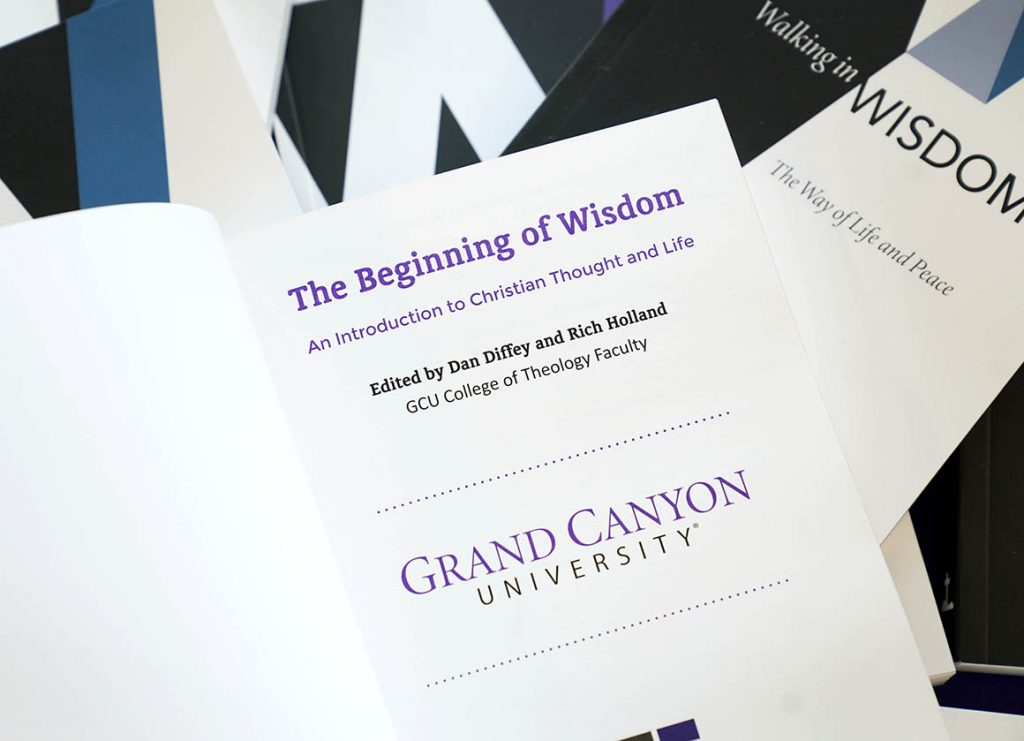
The key is how to live life today. Hiles noted that every step of the way, that was the focus:
“We said, ‘We’re actually going to have to introduce the biblical storyline to students because they don’t necessarily come in with that understanding.’ It’s a different day and age. In the 1950s, maybe everybody knew who Jonah was, but in the 2020s people don’t – they say, ‘A whale, a prophet, I don’t get it.’
“We’re doing Christian worldview and biblical introduction, but we’re also trying to talk to 21st-century students. We’re not trying to have a conversation with your mom and dad in the 1960s. We have to make it feel like it matters now, because it does. It’s not that the Bible or the Christian worldview are irrelevant; it’s that we have to demonstrate the relevance so that the lights come on.”
GCU’s K12 Educational Development team is distributing the books during Canyon Christian Schools Consortium visits, and they also will be available at Christian educational leadership events hosted by the University.
Cecelia Bosma, K12 Professional Development Manager, has written and begun training on “Integrating a Biblical Worldview in Learning,” which K12 schools or individuals can use to accompany the Christian Worldview textbook.
“I think it will help educators as much as it will help students, if not more,” Diffey said.
But the books are for everyone. Not just GCU students. Not just educators. Anyone who wants a guide to living – and who doesn’t need that these days?
I think it will help educators as much as it will help students, if not more.
Dr. Dan Diffey
“The Theology professors asked each other, ‘What are students struggling with?’ They’re dealing with mental health issues and these incredible stressors on their lives,” Hiles said. “Talking about peace is like a longing in their heart that we’re trying to connect with, and it immediately resonates with them.
“What Jesus is leading toward is peace. It’s shalom. It’s this deep sort of wellbeing that’s connected to what God is up to and has to do with a balance across your relationships, across your activities. It’s something different than what the world generally offers. There’s a lot of noise, there’s a lot of busyness and there’s a lot of pressure, a cacophony of strain on our life, but this is different. We were aiming for that, and we didn’t get to it until we talked about it a lot.”
The key is how to start the conversation – and keep it going – by understanding the Christian worldview.
And then acting on it.
Contact Rick Vacek at (602) 639-8203 or [email protected].
****
Related content:



































































